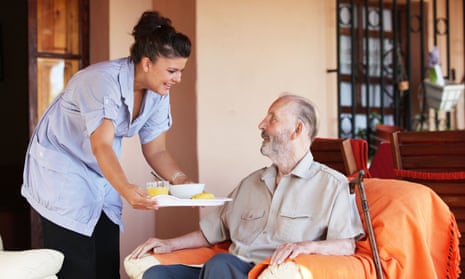Live-in care workers recruited from overseas to care for disabled and elderly people in Britain are being exploited by “unscrupulous” agencies who dock their pay to cover “accommodation costs”, according to new research.
The workers, who live with clients to provide round-the-clock care, in some cases had their pay reduced by hundreds of pounds a month despite being paid only the minimum wage to begin with.
The practice is exposed in a landmark report published by Nottingham University’s Rights Lab, the world’s biggest modern slavery research grouip, based on an 18-month study involving London-based live-in care workers from countries including Zimbabwe, South Africa, Hungary and Poland.
It identifies several cases where workers were given “unclear payslips where the number of hours worked and any deductions were not specified”, including instances where pay appeared to have been withheld unlawfully.
Employers can legally deduct £8.70 a day – up from £5.35 in 2016 – from workers’ pay if they are providing accommodation, as might happen with farm workers in rural areas.
But Dr Caroline Emberson, who led the research, and Dr Agnes Turnpenny, from the Institute of Public Care at Oxford Brookes University, said it was unethical and “absurd” that low-paid live-in care workers should be charged for accommodation when their jobs required them to stay in clients’ homes overnight.
As well as the deductions for accommodation costs, the research found that some workers were subject to sexual harassment or racist abuse, and were expected to carry out non-caring duties for the whole family such as cooking and cleaning. These workers were often left without support from their agencies, which act as an intermediary between workers and clients. Others were not given sick pay or holiday, were required to work more than 80 hours a week with insufficient breaks, and subjected to repayment clauses or exit fees – a practice first exposed by the Observer in March.
One care worker said she had found caring for vulnerable clients “rewarding”, but that she had been left scarred by encounters with a bad employer. “The pay was very low, they charged a lot for accommodation, and they treated me very badly. Basically they wanted to keep me as a slave,” she said.
The new research – which also involved academics from the London School of Hygiene and Tropical Medicine, the charity Focus on Labour Exploitation (Flex) and paid peer researchers with experience working in the sector themselves – will further fuel concerns about exploitation in social care, which is facing a staffing crisis and rising cases of modern slavery.
It warns that migrant live-in care workers, many of whom are women, are particularly vulnerable to exploitation: it describes them as a “hidden workforce” that is often “invisible in the local community” and “unheard” in national policy debates. It calls for a series of policy changes to reduce workers’ vulnerability to labour exploitation, including reforming the system of tied visas, where workers require sponsorship from a particular employer; removing or cutting visa fees; and banning or regulating repayment clauses to ensure they are not used to tie workers to their jobs.
It also suggests that, like agriculture, health and social care could become a sector licensed by the Gangmasters and Labour Abuse Authority – which would require recruitment agencies to register in order to supply workers to the UK, making it easier for employers to identify “fair and safe” recruiters.
Another of its recommendations is for the Department of Health to expand the remit of the Care Quality Commission to oversee live-in care workers’ employment rights. However, the department said it had “no plans” to do so.
Emberson said the research showed that urgent changes were needed to ensure live-in care workers, many of whom had come to Britain with the promise of good salaries and working conditions, were protected.
They often found themselves “isolated” in clients’ homes and dependent on agencies to ensure their employment rights were upheld, she said. “These vulnerabilities can make this form of care work a trap where the unscrupulous may keep workers in exploitative situations.”
Suzanne Hewitt, a care worker and one of the peer researchers, added that some care workers seemed to be “almost indifferent” towards their exploitation out of fear or because they believed that if they did speak up, nothing would change.
“They silently stew in their frustration, because all they want to do is care for the most vulnerable, all the while being vulnerable themselves,” she said.
